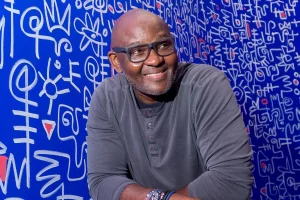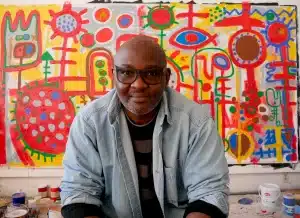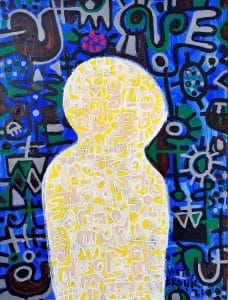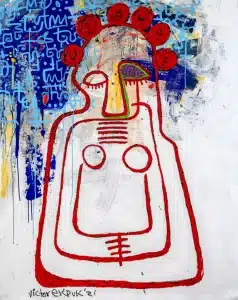
Showing in Dubai’s Efie Gallery, the exhibition marks the Nigerian-American artist’s first solo show in the region, bringing his work on Nsibidi to a new audience..
Victor Ekpuk (b.1964) is an internationally-renowned Nigerian-American artist based in Washington, D.C. His paintings, drawings, and sculptures reimagine the ancient Nigerian communication system, Nsibidi, to explore a diverse spectrum of meaning addressing historical narratives, the contemporary African diaspora, and humanity’s connection to the sacred.
Ekpuk’s three-decade long career has earned his works inclusion in numerous prestigious collections, including the Smithsonian National Museum of African American History and Culture; Smithsonian National Museum of African Art; Boston Museum of Fine Art; The World Bank; Bank ABC (Arab Bank Corporation) in the Kingdom of Bahrain; Kiran Nadar Museum of Art in New Delhi; Elizabeth Miller Sculpture Center; Hood Museum; Krannert Art Museum; Newark Museum; United States Art in Embassies Art Collection.
A multitude of symbols dance before the viewer’s eyes entirely encompassing several walls. These dozens of forms appear to be a cross-between calligraphy and an undeciphered script. Their proximity to each other makes it seem as if they were part of a long-lost text that is only now being revealed. The symbols seem to undulate like a wave in different colors. They are none other than the reimagined ancient Nigerian communication system, Nsibidi transformed into Nigerian-born Washington DC-based artist Victor Ekpuk’s unique language of abstraction exploring nsibidi “traditional” graphics and writing systems in Nigeria. A recurring signature element of his varied oeuvre, such symbolism has now evolved to encompass a larger spectrum of meaning focused on African identity, historical narratives, the African diaspora and the sacred and the spiritual.
Just as the original nsibidi sign systems were used to convey ideas, Ekpuk uses his reimagined symbols to explore the global contemporary art discourses of today, and how they are shaped by the past and the present. Nsibidi, a sacred and secret system of graphic communication among initiates of Ekpe (meaning “leopard” in Ekoi language) society of the Ejagham people of southeastern Nigeria and southwestern Cameroon in the Cross River region of Nigeria in sub-Saharan Africa, the symbolism is also used by the nearby Ibibio, Efik and Igbo peoples. Interestingly, similar to Ekpuk’s reappropriation of the language, the spoken and sign language of the ancient Nsibidi communication systems, he explains “actually cuts through the language barriers of the people with different languages.”
Ekpuk’s work spans three decades and can be found in the collections of leading international institutions, including the Smithsonian Institution National Museum of African Art (NMAFA); Smithsonian Institution National Museum of African American Culture & History (NMAACH); The Phillips Collection, Washington DC; the Bank ABC International Headquarter, Manama, Kingdom of Bahrain and The World Bank, among others. His work has been shown at major exhibitions and biennials, including the Institut du Monde Arabe, Paris; Museum of Arts and Design, NYC; Smithsonian National Museum of African Art, Washington, D.C.; Somerset House, London; New Museum of Contemporary Art in New York and the 12th Havana Biennial, Havana, Cuba.
As Ekpuk states: “The symbols I use reflects ideas of form and abstraction as a concept itself. By borrowing from the aesthetic concepts of nsibidi, I reduce forms and ideas into their basic lines. Nsibidi thus informs my style of abstraction.”
For Ekpuk, art is a mode of research, a way to explore contemporary and historical cultures. “Whether I mine writing systems or just explore the juxtapositions between the old and the new—these are all excavations that serve my work,” he explains. Rather than coming away with a specific meaning gained from the Ekpuk’s work, the viewer experiences and feels rather than reads what is in front of them. “I want people to feel the works, instead of trying to read my marks literally,” he adds.
Ekpuk’s bold, expansive, and colorful art is also greatly about the human condition and memory, specifically that of Africa and its relation to its diaspora. “Through my work I am marrying classical African forms with the contemporary,” explains Ekpuk. “More broadly, I am also looking at concepts of beauty and aesthetics in traditional African society and bringing them into the present.” Such concepts were further explored in his exhibition “Victor Ekpuk: I am my Ancestors’ Essence” at Tafeta in London in October 2021 and in continuation of same themed exhibition at Aicon gallery in New York City in 2022 whereby he juxtaposed forms from classical African art with aesthetics drawn from contemporary art.
Of note is “Meditation on Memory” which he created for the Havana Biennial in 2015. The project engaged members of the Abakua society in Cuba (equivalent of Ekpe society in Nigeria) to evoke and explore the sacred aesthetics and metaphysical relationship that still exists among the peoples of Africa and Cuba. The work included drawings, songs and incantations that honored his African ancestors in the diaspora. For the work, Ekpuk created a contemporary shrine for the memory of his Ibibio, Ejagham and Efik ancestors—ethnic peoples from southeastern Nigeria brought over to the Caribbean during the transatlantic slave trade. “The great spirit of Ekpe (a mysterious Leopard spirit from Nigeria) protected them through the crossing of the treacherous ocean; for the Cubans, their ancestral memories have been erased only on the surface,” explains Ekpuk in a statement during the Biennial. As Ekpuk demonstrates through this work as well as others, the same spirit of the Ekpe and other remnants from traditional Nigerian culture still sing and dance across the ocean in the sacred rituals of the Abakua society in Cuba.
Ekpuk’s work is largely and poignantly about historical memory and the ability of cultures to survive across the centuries through reinterpretation and appropriation. In many ways, his graphic geometric forms, indecipherable script speaks to all of us—harkening us back to an African past that unites all of humanity. In several of
his most recent works Ekpuk takes one of his reimagined West African symbols and enlarges it, transforming it into a solo work on canvas or a sculptural form. Imbued with color, their abstract forms take over exuding movement, life, and new meaning. His exhibition Coming Home in 2016 at Art House – The Space in Lagos, Nigeria was his first exhibition in his native Nigeria in over a decade.
The abstract figures and forms that he created as part of his residency burst with vitality, rhythm and form that is distinctly African as Ekpuk continues his exploration of the histories and symbols that characterize his homeland. His current work (from last solo exhibition I Am My Ancestors Essence”) continues such examinations of past and present histories infused with a fascinating interplay of the spiritual and the unknown almost as if they occupy a magical and mystical ream.
“The sculptures are borne out of the idea of me wanting to create something new from the forms in my drawings on the wall—I want to pull them off the walls and view them as three-dimensional objects,” he explains. He began making his painted steel sculptures in 2015, endowing them with the same vibrant coloring and bold abstract forms as those found in his wall drawings and paintings. For Ekpuk, cross-culture exchange is key as is the merging of the past and the present. As he states: “I am very interested in anthropology, wherever I go in my travels, I make it a point to meet the locals and get to learn their histories and culture. If I can, I create collaborative works, I want my works to be starting points for dialogue, new discoveries into the differences and commonalities among cultures.” In so doing, Ekpuk’s art strives to transcend the limits of time and the boundaries of the modern nation state to show the omnipresence of the past and its undying effect on the present
Victor Ekpuk will have a residency with Efie Gallery in Dubai beginning in September and then stage a solo exhibition with the gallery from October to December 2023.
Read more...

Showing in Dubai’s Efie Gallery, the exhibition marks the Nigerian-American artist’s first solo show in the region, bringing his work on Nsibidi to a new audience..

When Victor Ekpuk’s new body of work opened in late September at Efiɛ Gallery in Dubai, it marked the Nigerian American artist’s first solo show in the Middle East in his 30 years of practice..

Efie Gallery, Dubai’s contemporary art gallery specialising in artists of African origin, presents a new body of work by Nigerian-American artist Victor Ekpuk Nigeria.

Efie Gallery in Dubai just announced its partnership with Victor Epuk as the upcoming artist-in-residence in collaboration with New York University Abu Dhabi in Dubai..

Artist Viktor Ekpuk discovered that the symbols of the Nsibidi script could function as a form of abstraction — a way to reduce ideas to their essence..